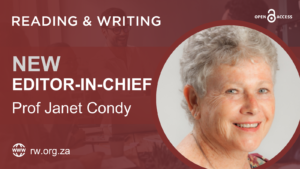AOSIS welcomes New Reading & Writing Journal Editor-in-Chief
AOSIS welcomes New Reading & Writing Journal Editor-in-Chief
AOSIS is pleased to announce that Professor Janet Condy was recently appointed as the Editor-in-Chief of the scholarly journal Reading & Writing.
After a very successful term at the helm of the journal’s editorial board, Dr Naomi Boakye hands over the reins of the journal editorship to Prof Janet Condy. Dr Boakye will, however, continue to serve on the managerial team. We would like to thank Dr Boakye for serving the journal with great success during her term as the editor in chief, and look forward to Prof Condy’s leadership to take the journal even further.
Prof Condy’s resume boasts an impressive list of qualifications featuring a Master of Science Degree at Wheelock College (USA) and a Ph.D. Degree obtained in 2006 at the University of Cape Town. Having received two Paul Harris Awards for extensive work in Literacy, she was elected as the Chair for IRA (International Developing Countries – Africa) in 2010. Amongst a long list of awards and honours, Prof Condy was promoted to Full Professor in 2018 and selected as Research Chair of Literacy development from 2019 – to 2021.
Prof Condy has made invaluable contributions to the literacy research field with numerous articles published in leading scholarly publications. She also peer-reviewed several conference proceedings, contributed book chapters to several scholarly books, and even authored her book titled: Make magic with reading: A teacher’s guide.
Reading & Writing Vision & Mission Statement: (by Prof Janet Condy)
‘Reading & Writing is the journal of the Literacy Association of South Africa. It is an open access, peer reviewed, inter-disciplinary, scholarly journal that explores how literacy is defined, enacted and promoted in a range of institutional, socio-cultural and disciplinary contexts particularly within Africa and other developing countries.
The journal recognises that the material form of texts is changing and that literacy involves the ability to ‘read’ and ‘write’ more than just words. Literacy should therefore be seen as the ability to consume and produce texts in and across a range of semiotic modes such as, oral, visual, gestural, spatial and written.
The journal publishes original research articles that provoke debate, explore issues and posit solutions in relation to literacy theory and practice. It focuses on research that addresses the question of access to literacy in contexts of poverty and linguistic marginalization. Particular concerns relate to literacy learning through a dominant language that is not the community language and to transnational and translocal literacies associated with immigrants and mobile people in African and similar settings. The aim is to design literacy practices in education to stimulate community based transformation and development.
The journal offers the breadth of outlook to promote interdisciplinary and multi-disciplinary research that can stretch and invigorate our sense of what concepts and approaches are both socially just and productive in the field of literacy education. It focuses on perspectives from the periphery that can speak back to the centre.’
We would like to welcome Prof Condy to the team, and look forward to all the expertise she brings to the journal.
Journal Focus and Scope
Reading & Writing is an open access, peer reviewed inter-disciplinary and inter-professional scholarly journal that explores how literacy is defined, enacted and promoted in a range of institutional, socio-cultural and disciplinary contexts’, particularly within Africa and other developing countries. The journal publishes original articles that provoke debate, explores issues and posit solutions about literacy interventions, practices and education. It focusses on and relates to transnational and translocal literacies associated with immigrants and mobile people in African settings. Read more.
DHET Accreditation and Indexing Services
The journal is DHET accredited and is included in leading indexing services which include the Directory of Open Access Journals (DOAJ), SCOPUS, SciELO SA and Web of Science Other Coverage, Emerging Sources Citation Index, ESCI, and ERIC.
Peer Review
The journal has a double-blinded peer review process. Manuscripts are initially examined by editorial staff and are sent by the Editor-in-Chief to two expert independent reviewers, either directly or by a Section Editor. Read our full peer review process.
How To Submit Your Manuscript
To contribute your latest research findings towards this publication, please visit rw.org.za. Authors can conveniently submit all manuscripts online. Please refer to the submission procedure when submitting your original manuscripts. The submission guidelines include information about the types of articles received for publication and preparing a manuscript for submission.
Frequently Asked Questions (FAQs) and Support Enquiries
Please visit our FAQs page for any other information you may require, and email submissions@rw.org.za for your support inquiry.
Follow the Journal on Twitter
We encourage you to follow the journal’s dedicated Twitter profile (@RW_Journal) to receive notifications as new articles are published. Help us share the latest articles by retweeting new posts to your Twitter network.
Subscribe to the Journal’s Mailing List
Please subscribe to the journal mailing list to receive email press releases.
We are looking forward to partnering with you to unlock African knowledge to the world.

